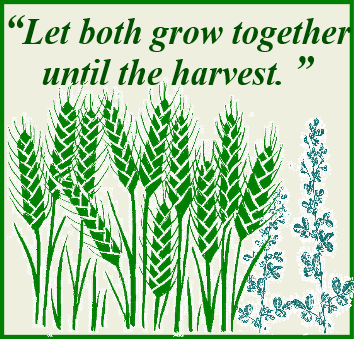Readings: Wisdom 12:13.16-19; Romans 8:26-27; Matthew 13:24-43
Theme: The Patience of God
Today’s readings highlight a virtue that is fast disappearing from our world: the virtue of patience. According to the British psychiatrist, Neel Burton, ‘Today more than ever, patience is a forgotten virtue. Our individualistic and materialistic society values ambition and action above all else…. Waiting, even for a very short time, has become so unbearable that much of our economy is geared at eliminating “dead time”.’ However, patience along with its inseparable companions – self-control humility, tolerance, generosity and mercy – is an essential ingredient of God’s world
The God we worship, as out first reading teaches, is patient and benign: a God ‘who cares for every good thing’; a God who is ‘mild in judgement’ and who governs us ‘with great lenience’ (Wisdom 12:13,17). Today’s Gospel reading from Matthew also underlines the patience of God. Extending the parable of the sower, which we saw last Sunday, Jesus tells his disciples that when the good seed begins to sprout, weeds (darnel) appear among the wheat, much to the consternation of the servants who would like to root them out immediately. However, the wise farm owner asks them to be patient, and to wait until harvest time. He points out that, if they try to remove the weeds now, they ‘might pull up the wheat with it’ (Mt 13: 29). So he tells them to let both grow together till the harvest. Then, the reapers can collect the weeds and burn them before gathering the wheat into the barn (cf. Mt 13:30).
The parable depicts a world with which we are familiar – a world where evil is mingled with good – weeds among the wheat. While the world is still God’s garden, it is not as God intended it to be. God planted only good seed. The Book of Genesis reminds us, when God had finished the work of creation, he ‘saw all that he had made and indeed it was very good’ (Gen 1:31). The presence of weeds is evidence of an enemy who has sneaked into the garden while the labourers were asleep and planted the bad seed (Mt 13: 25). Thus we have all kinds of evil in the world, from the most banal everyday variety, such as lies, jealousy, deceit, egotism and selfishness, to the most egregious – wars, human trafficking, mindless exploitation of earth’s resources, labour camps and torture chambers.
Today’s gospel is not telling us that we should do nothing about these weeds in God’s beautiful garden. As the Irish Statesman, Edmund Burke reminds us ‘All that is necessary for evil to triumph is for good people to do nothing’. There is much we can and must do, but we may not act prematurely to try and eliminate all evil from the world. We must not hasten the final judgement, which belongs to God alone. It is not for us to put ourselves in God’s place, as Joseph reminded his brothers who feared he might seek revenge for what they had done to him (cf. Gen 50: 1519). Unfortunately, history provides many examples of the disastrous outcome of ill-conceived attempts to rid the world of evil. More recently we have seen the tragic consequences of America’s wars in Vietnam (1954-75), Iraq (2003-’11) and Afghanistan (2001-’14). Even good people rarely get it right when they try to remove the weeds from God’s garden.
The history of the Church, too, has been marred by arrogant efforts to rid the Church of those regarded as propagators of error and confusion, resulting in witch-hunts and regular purges that continue right up to our time. I am thinking particularly of the shameful manner in which the Belgian theologian, Jacques Dupuis SJ, one of the finest theologians of the post-Vatican II era, was treated by the Congregation for the Doctrine of the Faith. In his letter to the recently appointed Head of this Congregation, Archbishop Fernandez, Pope Francis referred to the ‘immoral methods’ used by the Doctrinal Office in the past, ‘when rather than promoting theological knowledge it chased after possible doctrinal errors’. While acknowledging the importance of ‘safeguarding the faith’, Pope Francis insists ‘that nothing must overshadow the power and mercy of God’. As we were reminded in our first Reading, the lesson we need to learn from the patient and tolerant manner in which God treats everyone is to always treat one another with kindness and understanding (cf. Wisdom 12:19). This must include those who differ from us or are even hostile to us.
The good news is that we have a master gardener (God) who assures us that all will be sorted out in the end. God’s kingdom grows slowly but surely, as the parables of the Mustard Seed and the Yeast in the Cake illustrate. This assurance should free us from a dangerous preoccupation with getting rid of the weeds in God’s garden, and lead us to focus instead on sowing seeds of the kingdom. We can confidently leave the problem of the weeds to the master gardener and look forward to the day when he will gather the wheat into his barn. I will end by leaving you with a maxim from an anonymous source, posted at the entrance to the nursing unit in our SMA House in Blackrock Road – a maxim that gives me pause for reflection each time I read it: ‘Everyone you know is fighting some battle you know nothing about! Be Kind…Always.’ This is the best response to the challenge of today’s readings.
Michael McCabe SMA
To listen to an alternative Homily for this Sunday, from Fr Tom Casey of the SMA Media Centre, Ndola, Zambia please click on the play button below.

